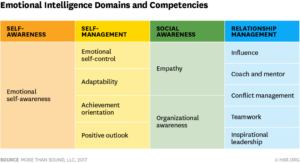
In the wake of the pandemic, it seems leaders at all levels are facing unprecedented stress and burnout, and in coaching calls even the most senior, seasoned executives are reporting fatigue; their own as well as what they see in their employees. Does this sound familiar to you? Below are excerpts from two different Harvard Business Review articles you may find helpful. And if that’s not enough, there’s a list at the bottom of a whole lot of TED talks on the subject of emotional intelligence that you may find relevant, too!
Why Some People Get Burned Out and Others Don’t
Authors Kandi Wiens and Annie McKee point out that
Stress and burnout are not the same thing. And while we know that stress often leads to burnout, it’s possible to handle the onslaught of long hours, high pressure, and work crises in a way that safeguards you from the emotional exhaustion, cynicism, and a lack of confidence in one’s abilities that characterizes burnout. The key is tapping into your emotional intelligence.
Want to know what you can do about it? In order to manage stress and avoid burnout, the authors suggest trying these things:
- Don’t be the source of your stress. Too many of us create our own stress, with its full bodily response, merely by thinking about or anticipating future episodes or encounters that might be stressful. People who have a high need to achieve or perfectionist tendencies may be more prone to creating their own stress.
- Recognize your limitations. Becoming more aware of your strengths and weaknesses will clue you in to where you need help. Surround yourself with trusted advisors and ask for help.
- Take deep breaths when you feel your tension and anxiety rapidly rising. Mindfulness practices help us to deal with immediate stressors and long-term difficulties. Heightening your awareness of your breathing may be difficult at first, for example, but remember that attention is the ultimate act of self-control.
- Reevaluate your perspective of the situation. Do you view a particular situation as a threat to something you value? Or do you view it as a problem to be solved? Changing your perspective on whether you’re experiencing distress or eustress can have an eye-opening effect on your ability to bring your stress level down.
- Deescalate conflicts by putting yourself in the other person’s shoes. The stress from conflicts often leads to burnout so it’s best to deescalate conflicts when you can. Be inquisitive, ask questions, listen deeply. Keep your attention to the other person and focus on what he is trying to tell you. By seeking to understand his perspective, you’ll be in a much better position to gain his trust and influence him.
Emotional Intelligence Has 12 Elements. Which Do You Need to Work On?
Daniel Goleman and Richard Boyatzis point out in this article that we may be defining emotional intelligence too narrowly. They suggest that “having a well-balanced array of specific EI capabilities actually prepares a leader for tough challenges.
 There are many models of emotional intelligence, each with its own set of abilities; they are often lumped together as “EQ” in the popular vernacular. We prefer “EI,” which we define as comprising four domains: self-awareness, self-management, social awareness, and relationship management. Nested within each domain are twelve EI competencies, learned and learnable capabilities that allow outstanding performance at work or as a leader (see the image). These include empathy, positive outlook, and self-control. But they also include crucial abilities such as achievement, influence, conflict management, teamwork and inspirational leadership. These skills require just as much engagement with emotions as the first set, and should be just as much a part of any aspiring leader’s development priorities.
There are many models of emotional intelligence, each with its own set of abilities; they are often lumped together as “EQ” in the popular vernacular. We prefer “EI,” which we define as comprising four domains: self-awareness, self-management, social awareness, and relationship management. Nested within each domain are twelve EI competencies, learned and learnable capabilities that allow outstanding performance at work or as a leader (see the image). These include empathy, positive outlook, and self-control. But they also include crucial abilities such as achievement, influence, conflict management, teamwork and inspirational leadership. These skills require just as much engagement with emotions as the first set, and should be just as much a part of any aspiring leader’s development priorities.
In order to excel, leaders need to develop a balance of strengths across the suite of EI competencies. When they do that, excellent business results follow.
How can you tell where your EI needs improvement — especially if you feel that it’s strong in some areas?
Simply reviewing the 12 competencies in your mind can give you a sense of where you might need some development. There are a number of formal models of EI, and many of them come with their own assessment tools. When choosing a tool to use, consider how well it predicts leadership outcomes.”
So many TED Talks on Emotional Intelligence!
1. Why Aren’t We More Compassionate?
2. The Art of Managing Emotions
3. You Aren’t at the Mercy of Your Emotions – Your Brain Creates Them
4. How to Practice Emotional Hygiene
5. Emotional Mastery: The Gifted Wisdom of Unpleasant Feelings
6. The Power of Emotional Intelligence
7. 6 Steps to Improve Your Emotional Intelligence
8. How We’ve Been Misled by Emotional Intelligence
9. The Light and Dark Side of Emotional Intelligence
10. The Gift and Power of Emotional Courage
11. The Three Secrets of Resilient People
12. The Importance of Raising an Emotionally Intelligent Child
13. Emotional Intelligence From a Teenage Perspective
14. The People Currency: Practicing Emotional Intelligence
15. Emotional Intelligence: Using the Laws of Attraction


This is great information, and very timely. Thank you Coach Suzi!
Hi, Darla! You’re welcome, glad it’s useful!